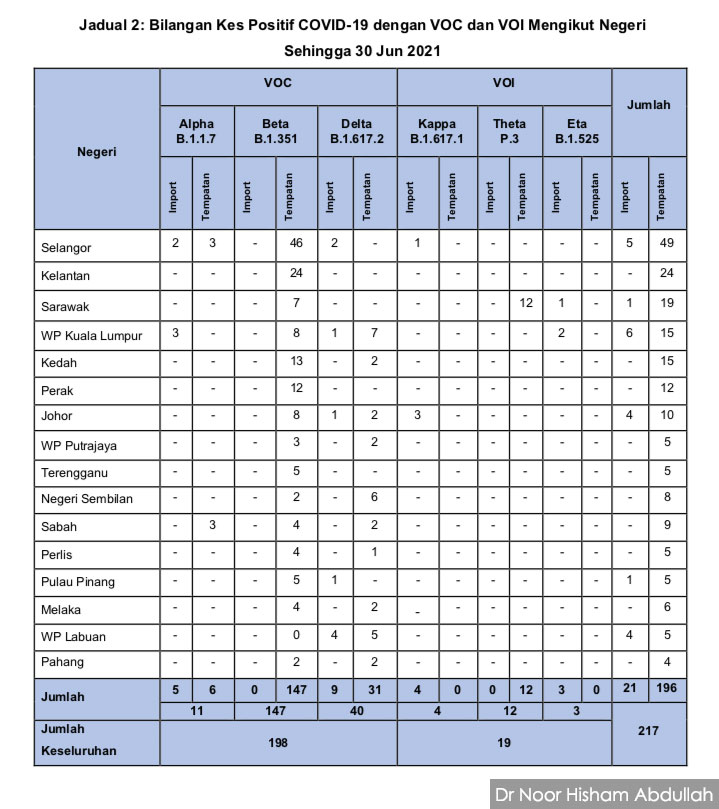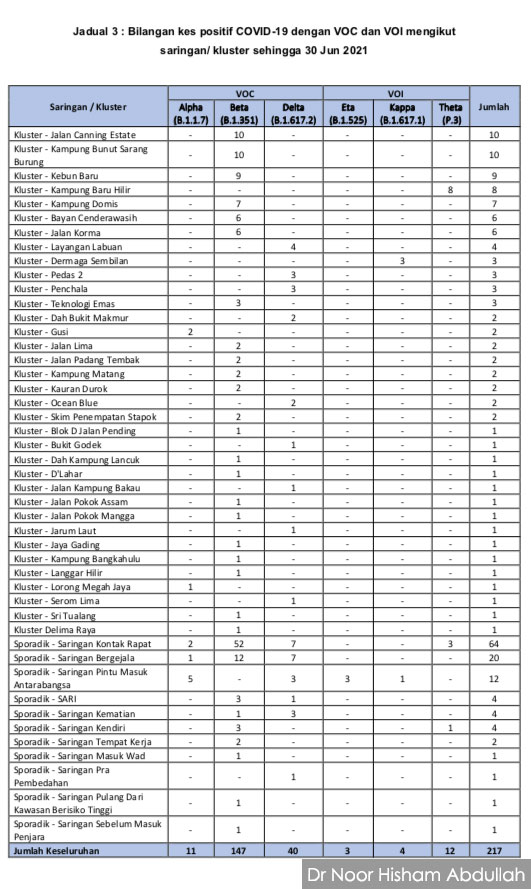Tally for Delta variant cases nearly doubles in a week
The number of Covid-19 sequences found to be of the highly contagious Delta variant has nearly doubled in the span of a week.
Since the variant was first identified in India up to June 22, Malaysia had detected 22 cases of the Delta variant through genetic sequencing. These comprised 13 local and nine imported cases.
In the one-week period after that, up to June 30, 18 more cases have been detected, all of which are local cases. This brings the total to 40 cases, of which 31 are local.
The new cases were detected in Kuala Lumpur (4), Negeri Sembilan (3), Labuan (3), Kedah (2), Sabah (2), Malacca (2), and Pahang (2).
Additionally, five cases of the Beta variant and two cases of the Alpha variant have been detected, according to a statement by Dr Noor Hisham Abdullah yesterday.
The statement did not mention how many Covid-19 test samples were sequenced during this period, but the figure is usually around 30 per week, based on weekly reports by the National Institutes of Health (NIH).
Noor Hisham did not state how many samples have been sequenced that were found not to involve a variant of concern (VOC) or variant of interest (VOI).
This comes as the government shortened the dosing interval for the AstraZeneca Covid-19 vaccine – a move that had been mooted earlier to counter the spread of the Delta variant.
For the record, Malaysia only sequences a small portion of its Covid-19 cases.
According to the NIH’s weekly reports, the Covid-19 samples are selected for sequencing if a large spike is observed at a particular location, or if referred by clinicians for sequencing due to some unusual clinical finding.
“There is no necessity to sequence every case because when a cluster is involved, the causative agent has about 99-100 percent similarity in the genomic sequence.
“Therefore, information from few representative cases is deemed sufficient to draw a conclusion,” the NIH said.
No analysis yet on the prevalence of variants of concern
To date, the Health Ministry has yet to publish any analysis on the prevalence of the various Covid-19 VOCs circulating in Malaysia.
Nevertheless, the 18 Delta variant sequences identified this week could mark a departure from previous trends, where the sequences are predominantly either of the Beta variant or non-VOC viruses.
In previous weeks, Malaysia’s sequencing efforts usually turn up less than five Delta variant cases, while the number of Beta variant cases is usually more than triple that figure and is consistently in the double-digits.
The Delta variant is associated with outbreaks in India, the UK and Australia due to its increased transmissibility, and is also moderately resistant to vaccine-induced immunity.
On June 12, the BBC quoted experts at Imperial College London saying that the Delta variant has an R-naught of between 5 and 8, compared to between 4 and 5 for the Alpha variant, and 2.4 to 2.6 for its ancestral Wuhan variant of the Covid-19 virus.
In Australia, the ABC reported the transmission of the Delta variant of the virus in "scarily fleeting" encounters between strangers that lasted mere seconds. This is compared to the 15 minutes previously thought to be necessary to put one at significant risk of being infected.
Vaccines are still expected to provide significant protection against the Delta variant but will require two doses.
Yesterday, Noor Hisham tweeted that one dose of either the Pfizer or AstraZeneca vaccine would only provide a 33 percent protection against Delta variant infections that develop symptoms.
With two doses, this increases to 88 percent for Pfizer and 60 percent for AstraZeneca.
Both vaccines also offer excellent protection against more severe forms of the disease, even after one dose.
According to Public Health England, the Pfizer vaccine had 94 percent efficacy against Delta variant cases that would otherwise require hospitalisation, and 96 percent after two doses.
With the AstraZeneca vaccine, the efficacy against such cases is 71 percent after one dose and 92 percent after two doses.
- Mkini
✍ Credit given to the original owner of this post : ☕ Malaysians Must Know the TRUTH
🌐 Hit This Link To Find Out More On Their Articles...🏄🏻♀️ Enjoy Surfing!






















Post a Comment